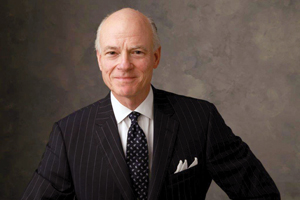President's Message
New commission will help the ABA establish justice for the 21st century

Photo of William C. Hubbard by Marc Hauser
The mobile phone is what Harvard Business School professor Clayton Christensen would call a "disruptive innovation." Cooper's innovation transformed the existing telecommunications market. He found a new way for people to communicate.
We need such creativity and innovation in the legal profession. For years, we have operated in an environment where 80 percent of people who are poor, and many others of moderate means, do not get the civil legal assistance they need. In many states, as many as 90 percent of parties in family court are not represented by a lawyer.
With our commitment to establish and expand justice, we will carry on the fight for adequate funding of core justice system functions, and we will continue our support for pro bono services and legal aid. But we also need fresh thinking and new ways to provide legal services to individuals and businesses alike. We all bank differently, shop differently and learn differently than in years past. As such, our clients and those who could be our clients expect us to deliver legal services differently.
The ABA must lead the way if we are to ensure that change will broaden opportunities for lawyers to thrive in their practices, increase access to justice, protect the public and preserve our professional independence.
The legal marketplace is changing rapidly. In 2012, $66 million was invested in legal technology startups. A year later, it was $458 million. These are not law firms. They are technology companies that offer legal services. Our legal and justice systems must embrace innovation to ensure that no one is left to fend for themselves in the pursuit of justice and liberty.
The new Commission on the Future of Legal Services will help the American Bar Association establish justice for the 21st century. Commission members represent the best and brightest of America's legal innovators, practicing lawyers, judges, academics and bar regulators. This diverse membership will help us develop fresh, practical ideas to close the justice gap, provide new opportunities for lawyers, and improve the delivery of legal services for all.
To inform its work, the commission is organizing community grassroots meetings on the future of legal services. Next spring, it will conduct a national convocation to highlight what the legal community is doing—and what can be done—to reach a broader market by marrying innovation with legal services.
The national convocation will follow in the tradition of two watershed events involving the future of justice. In 1906, the legal scholar and later Harvard law dean Roscoe Pound presented his legendary speech, "The Causes of Popular Dissatisfaction with the Administration of Justice." Pound's observations led the way to improvements in judicial administration and other justice system reforms.
Seventy years later, in 1976, Chief Justice Warren Burger convened the historic Pound conference to address popular dissatisfaction with the U.S. legal system and to examine how to make the justice system more responsive to the public. The Pound conference led to our modern alternative dispute resolution movement. Burger told attendees that it is "up to us to demonstrate whether we will be able to adapt the basically sound mechanisms of our systems of law to new conditions."
It is time once again for the bar to take up this challenge. Our efforts will position the ABA as the leader in making the justice system and the delivery of legal services smarter, more effective and more accessible to all. I encourage you to follow our work at ambar.org/abafutures.



